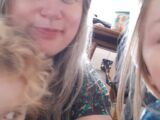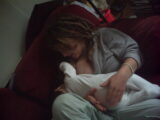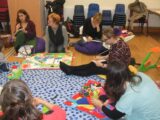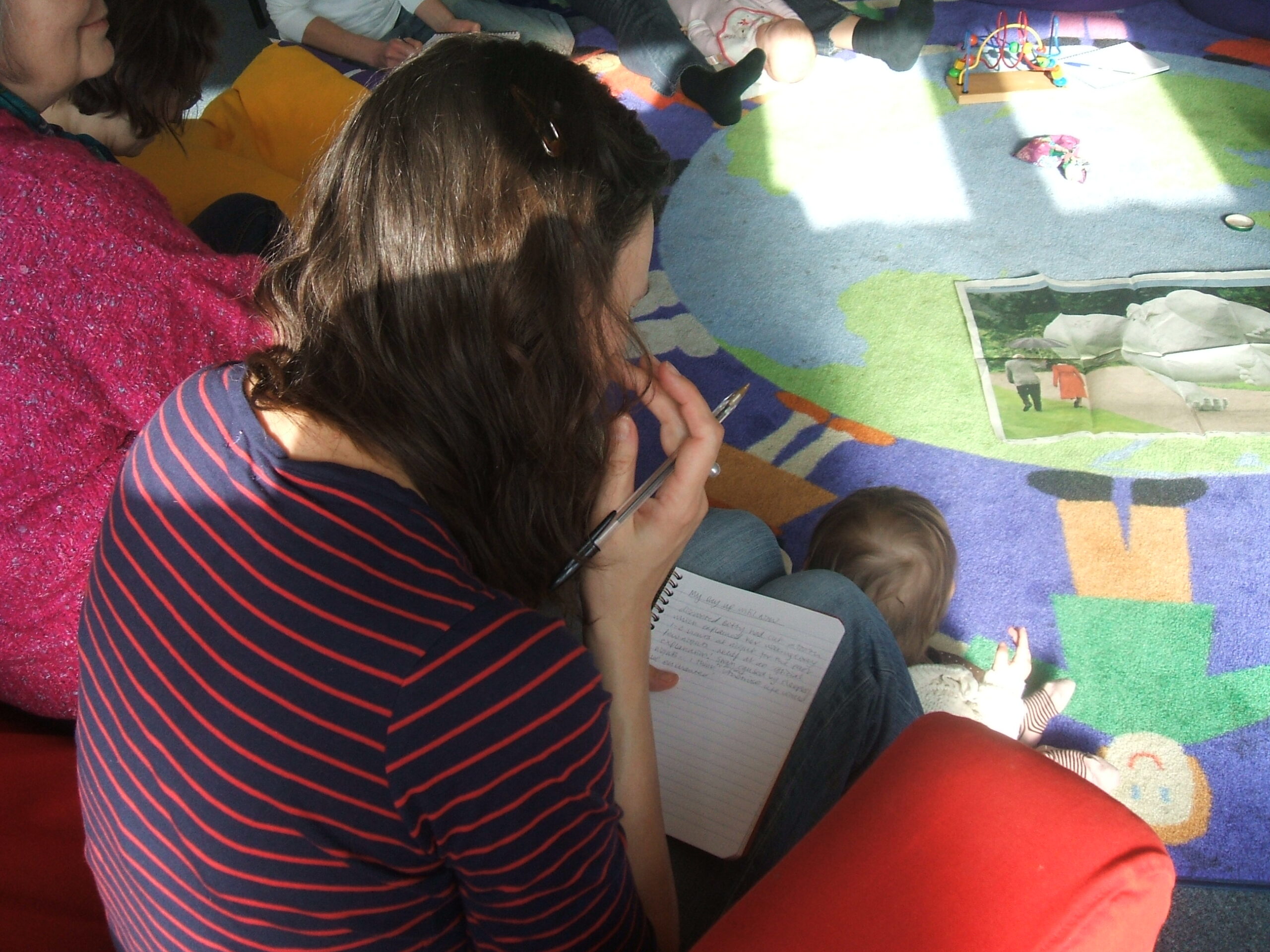Claire Robinson: Loss Adjustment
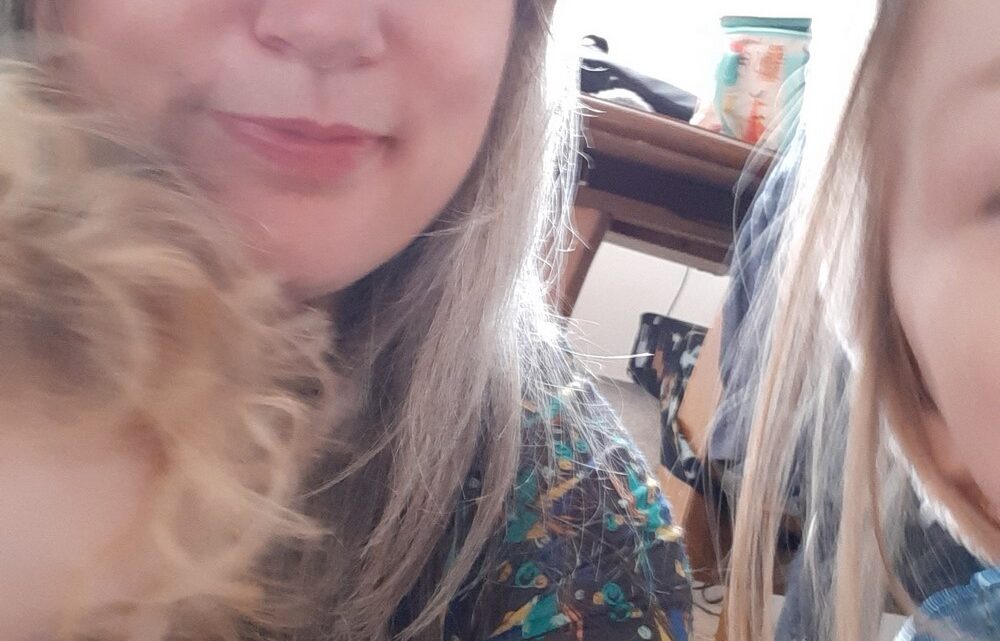
Nearly three years into this mothering lark and still the title mother doesn’t sit comfortably with me. It certainly doesn’t come first in my mind as a self-descriptor, despite the praxis of mothering occupying the majority of my time. I feel strangely distanced from it, although I am approaching it. It evokes to me a passive, unnamed subject devoid of individuality or personality; one befitting a tabloid piece perhaps: “mother dies in headlong crash”, “mother of two, 38, wins Nobel Prize”. ‘Mother’ is rarely a self-definition or deeply felt identity, but one that is imposed; denoting an identity fashioned from the needs and expectations of others. My sense of self following the seismic changes that becoming (and continuing as) a mother has wrought is more aptly described as ‘woman struggling with small people and the changed expectations upon her’ or ‘woman surveying things with disbelief and panic, looking for mum and realising she is it’. The notion of a mother can be seen very differently, of course. As a verb the word itself speaks of something active and vital, which is probably more like it. Moreover, the role of ‘mother’, with its various archetypes or caricatures is embraced gratefully by many. It is a peculiar term in that it means so much (as it signals the power and commonality of the female reproductive experience, biologically and socio-culturally) but in itself tells so little about the person behind it.
Last year I returned to a small Brighton room and met with a group of women – the room felt less cramped than two years before when there had been half the number there. My baby, who I had clutched and shushed throughout the sessions with the first group was now starting to seem a girl, and not there. Another child was residing in my belly and threatening to descend into my life any day. All those I met had two or more children; all wisened examples of the way forward for me. We shared the concerns of our days and weeks and were led in mindfulness practice in a sanctuary of sorts. It helped usher me into my second round of motherhood wonderfully.
The first time I had entered that space, the profile of the women I met with was equally fortuitous; we were all first timers with children born within a two week period. Both facilitators had just one child, but were much further on in their journeys. We were all at around 12 weeks post-birth, reeling with the eruption of the newborns we rocked and the weight of expectations. We all felt our identities and relationships with ourselves, partners and families had changed forever, and needed to explore that loss and adjustment; we also craved a space to revisit our experiences of birth and the immediate postnatal period. We found somewhere where we were capably guided in a non-judgemental manner to scratch at revealing the women we were before motherhood hit us, and to explore what was left and what we wished to recover or transform. We were able to reflect and reframe experience safely and unashamedly, using the conduit of writing. We were provided with references and examples of women who had gone before us and documented the terrain; creative women seeking to reclaim themselves and provide testimony from the frontlines. For me, I found a space to speak relatively unfiltered, express anger and bewilderment, and feel at one in a room of women for possibly the first time in my life.
Once I learned of MU I knew instantly that I must attend. I encountered Maggie’s strongly worded petition around the time of my daughter’s birth then read her Guardian article and website, gleaning that a discussion and writing course was starting soon. This particularly appealed as I understand the world and my experiences best in relation to the written word. The whole process proved invaluable, with guided exercises and opportunities for exploration facilitated by fantastic women, at a time when I would not have otherwise harnessed the emotion and confusion within me onto the page, or out of my mouth. I had hitherto made it to a few local baby groups, with Rhymetime proving the most successful (being reasonably short, starting late and entirely structured, with no real expectation of sociability). It allowed me to survey the array of newish mothers thrown up within the local area and feel some sense of not being alone. Singing songs and shaking instruments does something positive for the soul, but I still came away feeling disturbed; short-changed by the lack of connection in the room.
During the first MU session we were supported to introduce ourselves and set our stalls out somewhat. I distinctly recall the unease I felt as I trimmed the corner from the formula carton I needed to quieten my daughter and tipped it into a bottle – shame rising as my fellow mothers were both capably feeding on their breasts. I felt liberated of my discomfort as I gave voice to that feeling – and hopefully contributed to their understanding. Over the coming weeks we shared vignettes and visions of ourselves, and put down words on paper despite the distractions of those that drooled and mewled. We spoke freely of our fears in relation to seemingly selfish concerns; of never following our art or dreams, or feeling ourselves again. We’d all been knocked sideways by motherhood and reaped the benefits of conducting a collective welfare check, where we could be respectfully heard over generous selections of refreshments. Our babies’ needs and development remained secondary, but were an utterly necessary condition of it all. Gratefully, our connection continues to this day.
Having my second child, I still felt aftershocks from the first, but had the benefit of some plateauing behind me. I felt greater trust in my own judgement, in a position to use the past to inform and future to direct me; but with the wisdom to appreciate the necessity of residing firmly in the present (linking nicely to the mindfulness focus of the group). Following edifying discussion and snacks we undertook short practice, allowing me a rare chance to commune with the baby inside me and the body housing them, away from the demands of work and a toddler.
With a history of mental health issues and a great many years feeling adamant that motherhood would not be for me, I think I knew it would entail a struggle. I understood the gravity of it, so I sought to avoid it; maintaining that I saw myself as an old woman in a room full of books. All changed when predictably I felt that mid-thirties urge and slight panic. Still, the entire enterprise (each time) was not wholly planned. Discovering my first pregnancy shocked the life out of me, literally; a week later I experienced early miscarriage and was left reeling as I processed it all. That was my first personal encounter with the power of it all I guess. Having been a student midwife and up close to the horror of pregnancy, baby loss, labour and postnatal mental ill-health I had a realistic appreciation of how it all went. I’d taken keen interest in the Confidential Enquiry into Maternal Death (CEMD) reports collated with the charming Ronseal-esque title Why Mothers Die (see also CEMACH, CMACE and MBRACE-UK). I’d learnt that a leading cause of death for new mothers was suicide, and was unsurprised that the profile of those most likely affected was middle class, mid-thirties and educated; the high expectations lot – women sold the lie that their twenties must be for cocktails, careers and cohabitation with children waiting until later. A significant number of women at high risk of mental ill-health are those with IVF, rainbow or otherwise much sought after pregnancies. Being mid-thirties working class with a middle class education and milieu, I knew to treat motherhood with the reverence it deserved.
I felt affronted by the way mental illness was framed within midwifery theory and practice. The medical profession respects a simplistic typology of baby blues, PND and puerperal psychosis, with antenatal depression creeping in deservedly for attention. The lack of understanding and insight shown by my peers, teachers, mentors and other professionals was stark, even though the notion of PND was brought up all the bloody time… Midwives and health visitors were very well-meaning but disposed to see it as a discrete episode resolvable via submission to a course of treatment that would return women to their old selves; a convenient label serving to subdue voices even further than the experience itself. I bore witness to how a woman with ‘query puerperal psychosis’ was treated; privy to the tacit contempt and bemusement at ward handover. I saw a highly anxious and distressed woman denied the means to process and express her experience. She was traumatised following a forceps delivery, ruptured cervix and subsequent surgery and reluctant to see the son she expressed milk for (which her devoted mother fed him) whilst petrified that her undercarriage was splitting open. I accompanied a dismissive cow of a midwife who refused the woman a pen and paper so she could record details about her care and track feeding. I happily gave her mine and spent as much time as possible with her. The psychiatric team eventually conceded she wasn’t psychotic, so the excitement at handover diminished. I recall the words highly strung and pathetic being used. As she left the ward with her family I urged them all to look after each other and recognised her distress as a rational response to a life changing event. Back then though I couldn’t understand what she was headed home to; those first few weeks and months that blindside and bludgeon you. She would have benefited from a MU group. Soon after that I chose not to continue in midwifery.
MU is testament to the way in which the creative process and expression is vital to health and I mention the group to all new mums I know. Becoming a mother messes with you, no matter how thoroughly you research and plan, how relevant your emotional or practical experience, how much stuff you acquire, or how much support is on offer. Even the most realistic expectations will need revision; the clearest thinkers will acquire brains like balls of matted wool that need unravelling. In time it is possible to fashion something nice out of them, with or without a pattern, but a knitting circle sure helps. In fact, once the shit dies down there is often an abundance of creativity, resourcefulness and enterprise attached to mothers, arising in different ways. There’s the ‘if not now, when?’ aspect to pursuing long held hopes and dreams, the desire to harness the power and potential realised by producing people, the omnipresent inward pressure around role modelling to your kids and of course, the economic imperatives that make flexible income gathering a necessity.
Attending MU showed me the value of peer support and applying a critical approach to the mothering endeavour. It served as an invaluable induction into my new life and instilled a confidence to develop and maintain relationships with a diverse network of women. Viewing motherhood through the lens of MU encouraged me to give voice to my struggle, and to support other women; focussing them, valuing their work and acknowledging their fears, challenges and confusion. I feel able to glimpse the woman behind every mother I encounter and not feel alienated, judgemental or competitive, no matter how they present or mask; to offer a kind word and speak with an honesty that names the elephant in the room. Simply saying “it’s bloody hard isn’t it?” or “well done for getting here/keeping them alive” to women frantic in their exhaustion and efforts to convey ease, seems to engender such relief and connection, in ways that the sharing of baby milestones and weight loss tips doesn’t. My mind often returns to the faces and voices that I knew in that room; I think it always will.
